
![]()
~ THE JEWISH CEMETERY ~
CANTERBURY
Dates from the 1760's
The Cemetery adjoined the Friends' Burial Ground at Forty Acres Road, off of Whitstable Road
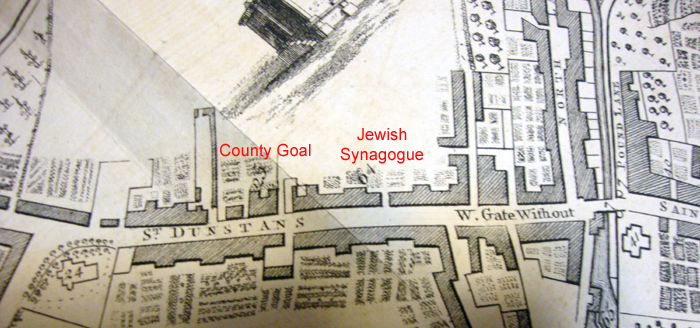
William Gostling Map detail showing the Old Jewish Synagogue
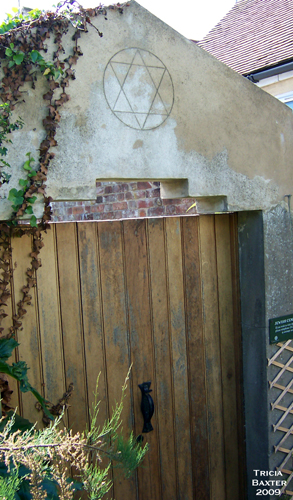
The entrance to the Jewish Cemetery
My dear Kitty,
I hope you and your girls are
well none the worse for the fast yesterday. Expect your grandchild is
a great pleasure to you, and that you are looking forward to no. 2.
I was at Hannah's yesterday, she has had a cold but better now, so is
David who has also been in the house since Thursday.
Mr. Phillip Hart son of the late Alderman Hart of Canterbury & Dover,
who is a personal friend of mine, came to see me on Saturday in reference
to the cemetery at Canterbury which is in a horrible state of dilapidation
as there have not been any Jewish people living in the town for years
if it is put in thorough repair which will cost 80 pounds to 100 pounds
the London Board of Deputies have agreed to take it over and for all
times to keep it in good condition so that there will never be any further
call on anyone. Those buried there include your great grandmother Mrs.
Nathan and Aunts & c. He is writing to all his family and asked
me to do the same for mine (but of course there are not many left now
to whom I can apply). He called on your Uncle Sam who said none of his
folks were inter'd there, but as he had a sister (your dear Mother)
who lived at Dover, he promised 10 pounds, 10-0, and at same time advised
him to ask his nieces and nephews whom it might concern, as from the
income he had settled on them, they could well spare a little, and shall
be glad to hear if I may include you amongst them. Mr. P. Hart is giving
10 pounds, myself 3 pounds 3-0, David and Eva have promised me 2 pounds
2-0 each. I saw Fanny this morning and she is speaking to Joe, Mark
& Kitty, and expects they will be sending 10 pounds between them.
The Synagogue (which is in the worst slum of the city) has been disbanded
and the scrolls of the law presented to the Oxford Jewish Congregation.
Just rang up .lory? Hart but she was out. Can you suggest anyone else
who might be interested? I am writing Ida by this post.
With love and all good wishes for The New Year.
Yours affectionately, Kate
(60 Eton Avenue, N.W.3.) 11.10.32 Primrose Hill 2512 - posted Hamstead
To Mrs. Glassman, 84 Westbourne Avenue, Hull
From a letter in my collection
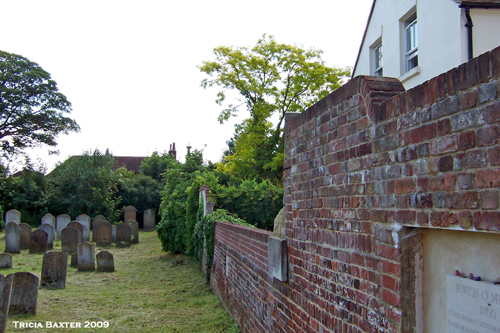
The Jewish Cemetery
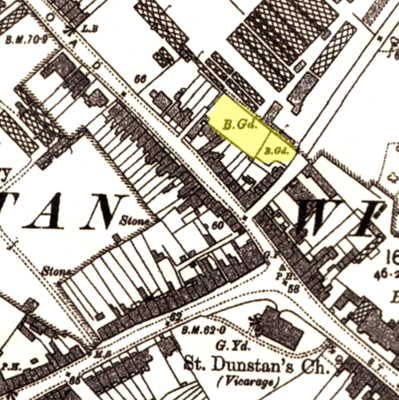
Located between 26 & 28 Whitstable Road, the highlighted images in yellow are the Friends Burial Ground and the Jewish Cemetery
The burial ground consists of approximately 150 graves. Names such as Abraham, Cohen, Hart, Isaacs, Jacobs, Moses, Simmons, Solomon, etc
*There is a burial list by Michael Jolles (burials from the late 1700's to early 1900's)
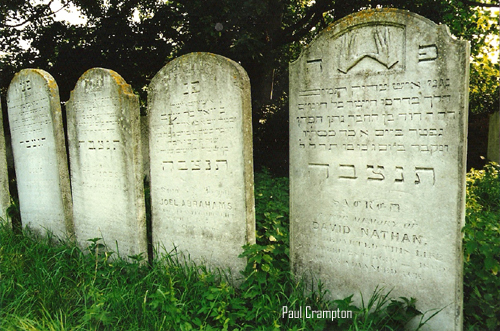
from left: Unknown, Frances ABRAHAMS, Joel ABRAHAMS & David NATHAN
Alderman Henry Hart J.P. was mayor of Canterbury from 1869-71. He was the brother of Sir Israel Hart.
A mortgage to Mordecai Hart, Pawnbroker 1843 Warrant of Attorney to Mordecai Hart
Henry Hart was also a Pawnbroker with a shop in Best Lane. Death of a Henry Hart age 88 in Dover in 1921. (thanks to Tricia for this information)
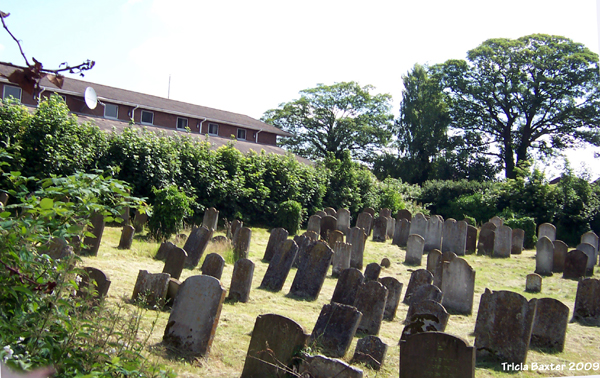
Gravestones in the Jewish Cemetery
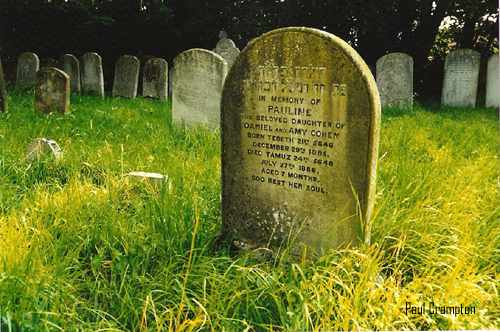
In Memory of
PAULINE
the beloved daughter of
Daniel and Amy COHEN
Born Tebeth 21st 5646
December 29th, 1885
Died Tamuz 24th, 5646
July 27th, 1886
Aged 7 months
God rest her soul
King John and the Jews in Canterbury
King John, whose reputation, neither as a monarch nor a man, had ever a "sweet savour" in history, possessed nevertheless a certain sort of popularity among the lower classes of his subjects. At all events, he holds in the popular sons and legends a rather more favourable position than he does in any other records.....
This monarch was occasionally at Canterbury. From this city he proceeded to Dover on his disgraceful mission to resign the crown of England to Pandulf, the Pope's Legate. According to the itinerary of his journeys, he appears to have proceeded in a dilatory and tortuous manner, on his royal road to degradation.......
King John addressed many special communications to his "good city of Canterbury" and honoured it by levying sundry exactions on its inhabitants.
A.D. 1205, he gives a mill at Canterbury "to his beloved clerk, Master Peter of Inglesham."
A.D. 1212, he demands of the Praepositi and good men of Canterbury, if they will love him, eighty men armed, of the best men of Canterbury, to be sent to him at Westminster.
A.D. 1214 he writes from Rochelle, demanding a special contribution from Canterbury on account of the Pope's interdict having been relaxed.
A.D. 1215, he demands a supply of pike heads* as many as possible to be sent without delay to Rochester; and that all the smiths of the city be taken off all other work whatever, and work night and day to expedite this demand.
The same year he demands a quantity of wheels, or wheeled carriages for his use.
He takes away certain houses belonging to the Jews at Canterbury, and among others he presents to William de Waren, Earl of Surry "the house belonging to Benedict, the little Jew, and to Isaac, his brother of Canterbury, in Jewry, London."
John, it is well known, considered the Jews of England as his special property, and although he at times protected them against the encroachments of others, and even naively observed in reference to this people, in one of his decrees to the city of London, "that if it were a dog, and he had taken him under his protection, he would defend him;" he never spared them when his own wants were to be gratified.
He would give away their houses and chattels with impunity; sometimes to the most unworthy favourites, in liquidation of a gambling debt, or as a reward for an after-dinner jest. Sometimes one Jew was robbed for the advantage of another; thus he bestowed upon Abram, the cross-bowman, a Jew, the house of one Isaac, son of Jacob, and Bona his wife at Canterbury.
Many Jews appear from an early date to have resided at Canterbury; the designation "Jury Lane" suggests the locality they inhabited.
It is not perhaps generally known that the Jews formed part of the population of England even in Anglo-Saxon times. In a charter of Witglaff, a king of Mercia, conceded to the monks of Croyland, the Jews are recognised as holding, or having held possessions. This charter, if authentic, was granted A.D. 833. In the "Canonical Excerptions," published by Egbricht, Archbishop of York, A.D. 740 Christians are forbidden to be present at Jewish feasts.
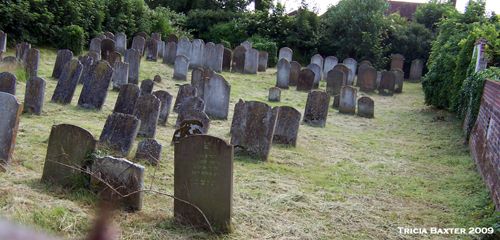
The exact period at which the Jews entered this country is uncertain. A brick of Roman manufacture is said to have been found in some excavations in London, having in relief a representation of Sampson driving the foxes into a field of corn. From this very doubtful evidence it has been supposed that the Jews, after the destruction of Jerusalem, extended their wanderings to Britain, when under subjection to Rome.
From the time of William the Conqueror to the 18th Edward the First, when the Jews were expelled the kingdom, they suffered almost every variety of extortion and oppression, paying for the commonest rights of mankind, justice and protection, the most exorbitant sums.
King John for a few years relaxed this cruel policy, and gave them a charter of protection; in the eleventh year of his reign, however, he recalled this grant, although he had received for it four thousand marks, and suddenly ordered all the Jews in England to be imprisoned until they had made a disclosure of their wealth.
The Jews were the earliest bankers and money lenders; and as from the precariousness of their possessions, and from the general insecurity of all property in the Middle Ages, they demanded a high rate of interest, they might fairly be classed as usurers.....
The Jews at Canterbury were probably not more liberal than their countrymen elsewhere; Peter of Blois, Archdeacon of Bath complains of "being dragged to Canterbury to be crucified by the perfidious Jews:" he had borrowed money of them, and he writes to his friend the Bishop of Ely, begging him to interfere for his protection, beseeching him "to become bound to Sampson, the Jew, for six pounds" which he says, "I owe him, and thereby deliver me from this cross." The figurative cross to which the worthy archdeacon alluded became a material one with the antiquary, William Somner, historian of Canterbury, who believed that the Jews crucified every child they could get at about Christmas**........
John Brent, Canterbury
** Eighteen Jews were hanged, as we have already seen, in the reign of Henry III., on the charge of crucifying a Christian child. from an article written 1883
History of the Jews in England - At Norwich on the occasion of some Jews being executed upon a charge of having stolen a Christian child, the citizens broke into and stripped the houses of the Jews there, and, setting fire to them, burnt them to the ground. At Canterbury, the Jews were subjected to a similar violence, the immediate cause of which is not mentioned; but it is stated, that the clergy there did not scruple to encourage the outrage, and to take an active part with the mob on the occasion. 1830
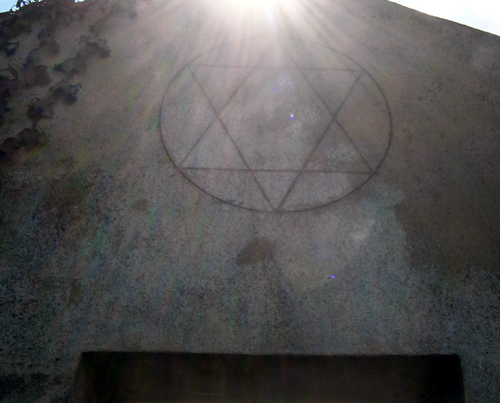
The Star of David on the entrance to the cemetery
...With all his love of justice, this King acquiesced in, if he did not openly sanction, the persecution of the Jews. Henry III, with a view to enrich his coffers, had issued a precept to the Sheriff of Kent, requiring him to send six of the richest Jews from Canterbury, and six from Rochester, to confer with him on their arrears of tallage; and the same course was pursued in every town where there was a Jews' Quarter. Among the foremost of their oppressors in the reign of Edward I. was Archbishop Peckham, and it was the greatest stain on his character. He issued an edict for the destruction of all their synagogues in the diocese of London, which would have been carried into effect had it not been for the timely interference of the King. In 1275 they were compelled to wear a badge, and in 1277 two hundred and eighty of them were hanged for clipping and coining.
In 1290 a proclamation gave them the choice of quitting England within four months or becoming Christians; they were however permitted to carry away with them their moveable property. The passage of the poor was to be at a moderate fare, and the Sheriff of Kent was to see that no one was plundered. Some of the wealthiest of them secured a vessel, and took on board their most valuable effects. They proceeded as far as Queensborough, where the captain allowed the vessel to drift on the sands, and then enticed the Jews to land and walk upon them. The tide returned, and the captain left them to their fate, telling them to call upon their prophet Moses, who had brought their fathers out of the Red Sea. Rapin says the vessel belonged to one of the Cinque Ports, and when the King heard of this villany he caused the master and several of the mariners to be hanged. A History of the Weald of Kent
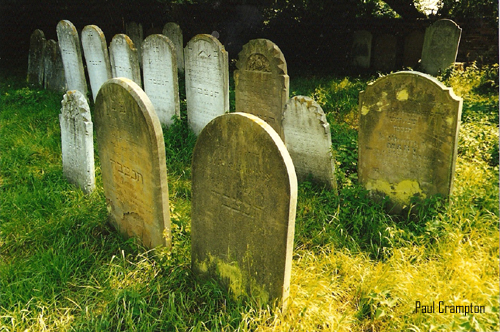
Showing some of the stones in the cemetery